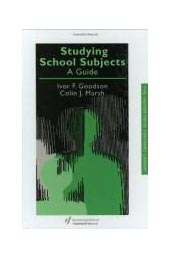Studying School Subjects: a guide
Conclusions, Complexities and Conjectures
Alongside field biology a sub-group promoting biology as a 'hard science' based in laboratories gained increasing adherents. The rise of molecular biology with the work of Crick and Watson in the 1950s gave a changed impetus to the work of this group.
In the new universities opening up in the 1960s and in schools following the Nuffield project, this group managed to dominate the versions of biology that were accepted. Hence the 'hard science’ version was embodied in the new laboratories that were then being built and in the departments that were set up.
So dominant did the 'hard science' group become in biology, that for a time the ecology and field biology sub-group developed defensive connections with environmental studies. As with geography a number of professors associated with the sub-group appeared at events or in publications sponsored by the National Association for Environmental Education. However, although only a sub-group on the defensive within biology, the field biologists secured a dominant position (along with the field geographers) in the field studies movement which grew rapidly as the 'environmental lobby' gained momentum. The field biology sub-group was thereby able to develop important new 'territory' inside the growth area of field studies which partly compensated for losing the battle for mainstream biology to the hard-science sub-group. By securing this leading role in field studies any permanent collusion with the rural studies groups promoting environmental studies was rendered both unnecessary and undesirable.
In both geography and biology the sub-groups allied to distinctive versions of the subject often gathered very different degrees of support according to whether school or university groups were being considered. Sometimes this reflected a time-lag effect as the new versions of the subject only slowly worked their way into the schools with new graduates taking up teaching posts in them. This was for instance the case in the battle between the regional geography and new geography groups: a long time after new geography was well established in universities, regional geography retained the allegiance of the majority of school teachers.
In rural studies the varying support according to whether one concentrates attention on school or university groups, was never an issue as the subject was not taught in universities. The sub-groups within rural studies therefore concentrated on particular versions of the subject within schools. In the period when environmental studies was launched, the two main groups were those who wanted to quickly attach rural studies to a new examination subject with some connections in the tertiary sector and those who wanted to retain traditional rural studies as a subject of outstanding appeal to the more 'practical' pupil. The battle over the name of the subject association and the new subject recorded in Chapter 8 was essentially a battle between these two sub-groups and a resounding victory for the first group.
